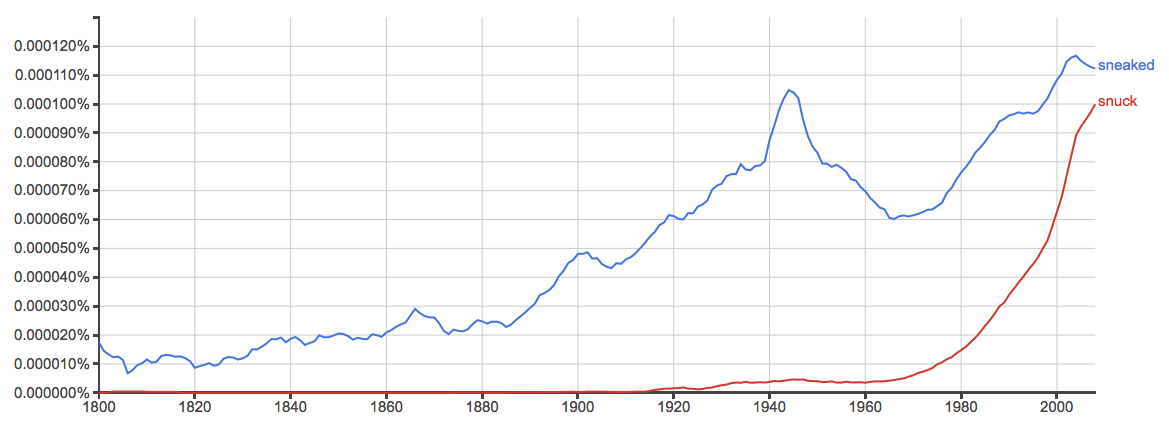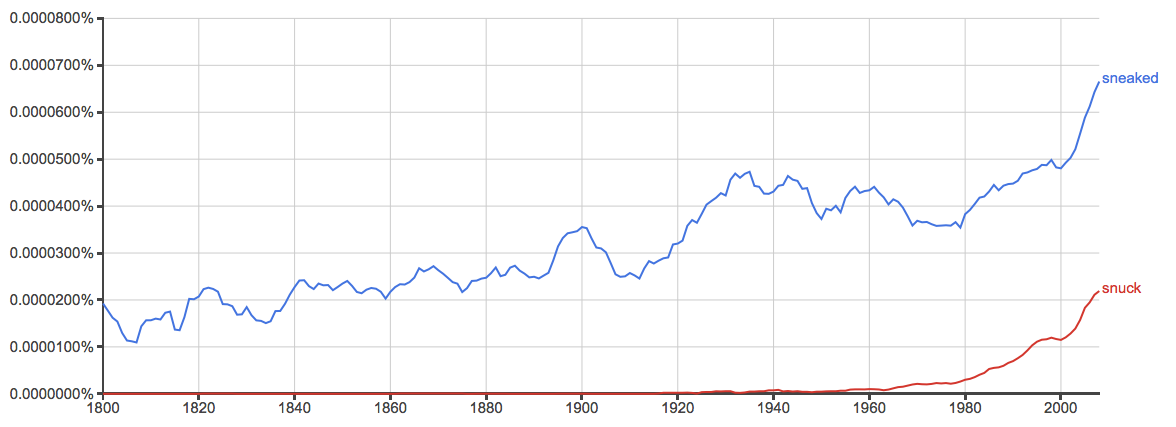These two words cause a lot of confusion among writers and elicit some strong opinions from the editorial and publishing class.
So, which is correct to use: snuck or sneaked? Are they both acceptable? This, of course, largely depends with whom you are speaking, but, today, I want to go over the debate between sneaked vs. snuck.
In this post, I will provide a brief history of the two words, outline the current landscape of their usage, and give you some advice for how to proceed in your writing.
What is the Difference Between Sneaked, Snuck?
 The verb that both of these words stem from, of course, is the verb to sneak, which is defined as to go or move in a quiet, stealthy way.
The verb that both of these words stem from, of course, is the verb to sneak, which is defined as to go or move in a quiet, stealthy way.
- Don’t you try and sneak away from me.
- Try to sneak some snacks into the theater.
The origins of the word are somewhat mysterious. Its first recorded use in print was in the 16th century. Promptly thereafter it made its way into the language of playwrights and thereby popularized itself.
What is the Past Tense of Sneak?
 Now, the trouble only comes when you bring the present tense sneak into the past tense sneaked (snuck?).
Now, the trouble only comes when you bring the present tense sneak into the past tense sneaked (snuck?).
Sneaked is the traditional, and more common, past tense and past participle of the verb to sneak. It follows a regular construction of the verb: sneak > sneaked > (have) sneaked.
- The dog will sneak out of the backyard.
- The dog sneaked out of the backyard.
- The dog has sneaked out of the backyard every night this week.
This construction follows other similarly spelled verbs. For example, creak > creaked, freak > freaked, leak > leaked, peak > peaked, peek > peeked, reek > reeked, squeak > squeaked, streak > streaked, wreak > wreaked, shriek > shrieked, etc.
All of this supports the traditional formation of the past tense sneaked, and is what traditionalist will point to when arguing that snuck is incorrect.
Language, however, rarely evolves in a logical fashion, and we are left to pick up and make sense of its pieces.
Enter snuck.
The History of Snuck
Snuck is an American creation dating back 1800s ¹ as a nonstandard, regional variant of sneaked.
It was met first with widespread condemnation, but snuck has, with each passing generation, become more and more widespread in its use.
In fact, the below chart shows just how popular it has become in the United States, being used with almost equal frequency as the traditional sneaked.

This Google Ngram obviously isn’t 100 percent representative of a word’s full use in a language, but it is good for observing trends. Snuck is clearly gaining ground and becoming more common.
There is a similar trend happening in British English, albeit at a somewhat lesser rate. As the graph below shows, snuck is being used with increased frequency in Great Britain as well.

Should I Use Sneaked or Snuck?
The word you choose for your writing will largely depend on your audience and the rhythm of your prose.
My advice would be to default to the traditional sneaked, although there isn’t anything necessarily wrong with using snuck. Sneaked is considered the standard English past tense form, while many dictionaries still classify snuck as informal, partly because it’s the newer of the two words.
Nonetheless it is quite common to see snuck in American publications.
- “A lawyer sneaked a former divorce client into an illegal sweetheart lease in an Upper East Side building and never told the incoming landlord, according to a lawsuit.” – New York Post
- “He was working in another showroom, snuck a peek at my ride and ordered it on Amazon after I finished a few circles around the showroom”- Forbes
Sneaked is the safer choice and you won’t raise any flags in the reader’s mind if you use it. Many publications still prefer the use of sneaked over snuck. The AP Stylebook requires the use of sneaked for instance. Garner’s Modern American Usage favors the use of sneaked. And if you are a writer for any British publication, the British speaking public still widely favors sneaked.
Similarly, if you are writing a piece of formal writing, whether it be a research paper for school or a book for publication, you should probably use sneaked.
Summary
The snuck vs. sneaked debate will likely not be a debate for much longer. Both words are approaching equal frequency in American English and snuck is gaining ground in British English.
However, it is still advisable to stick with the traditional sneaked in any formal writing.
Contents
